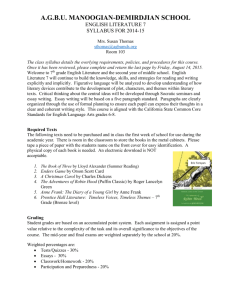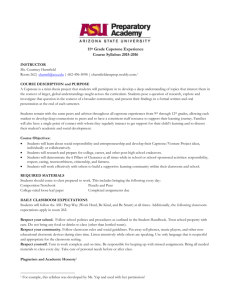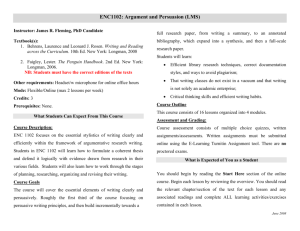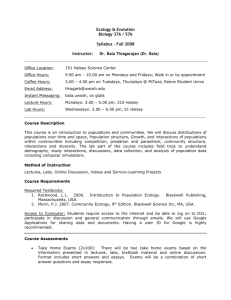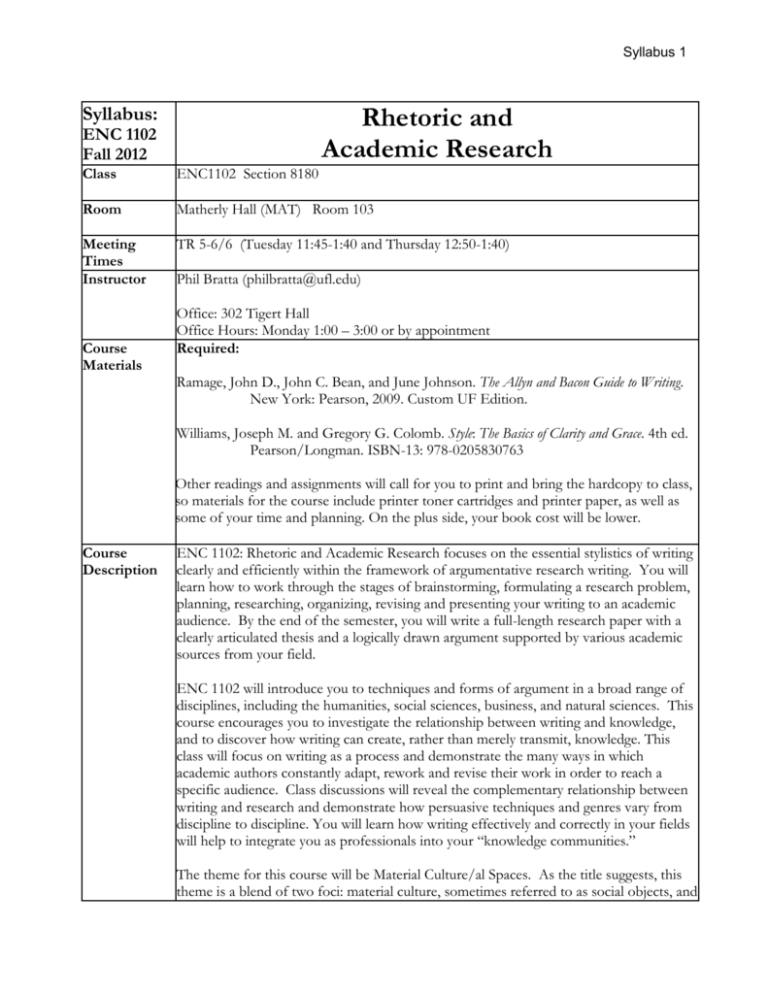
Syllabus 1
Rhetoric and
Academic Research
Syllabus:
ENC 1102
Fall 2012
Class
ENC1102 Section 8180
Room
Matherly Hall (MAT) Room 103
Meeting
Times
Instructor
TR 5-6/6 (Tuesday 11:45-1:40 and Thursday 12:50-1:40)
Course
Materials
Phil Bratta (philbratta@ufl.edu)
Office: 302 Tigert Hall
Office Hours: Monday 1:00 – 3:00 or by appointment
Required:
Ramage, John D., John C. Bean, and June Johnson. The Allyn and Bacon Guide to Writing.
New York: Pearson, 2009. Custom UF Edition.
Williams, Joseph M. and Gregory G. Colomb. Style: The Basics of Clarity and Grace. 4th ed.
Pearson/Longman. ISBN-13: 978-0205830763
Other readings and assignments will call for you to print and bring the hardcopy to class,
so materials for the course include printer toner cartridges and printer paper, as well as
some of your time and planning. On the plus side, your book cost will be lower.
Course
Description
ENC 1102: Rhetoric and Academic Research focuses on the essential stylistics of writing
clearly and efficiently within the framework of argumentative research writing. You will
learn how to work through the stages of brainstorming, formulating a research problem,
planning, researching, organizing, revising and presenting your writing to an academic
audience. By the end of the semester, you will write a full-length research paper with a
clearly articulated thesis and a logically drawn argument supported by various academic
sources from your field.
ENC 1102 will introduce you to techniques and forms of argument in a broad range of
disciplines, including the humanities, social sciences, business, and natural sciences. This
course encourages you to investigate the relationship between writing and knowledge,
and to discover how writing can create, rather than merely transmit, knowledge. This
class will focus on writing as a process and demonstrate the many ways in which
academic authors constantly adapt, rework and revise their work in order to reach a
specific audience. Class discussions will reveal the complementary relationship between
writing and research and demonstrate how persuasive techniques and genres vary from
discipline to discipline. You will learn how writing effectively and correctly in your fields
will help to integrate you as professionals into your “knowledge communities.”
The theme for this course will be Material Culture/al Spaces. As the title suggests, this
theme is a blend of two foci: material culture, sometimes referred to as social objects, and
Syllabus 2
cultural space, both real and imagined. In terms of the former, the social value of physical
things is often overlooked in the study of human interactions and writing. We are not
only surrounded by materials, but engage with objects to gain a sense of meaning in the
world. We give gifts, we show off our wealth, we collect things, we dress provocatively,
we decorate our homes, and we use pens, cell phones and computers to communicate.
In terms of the latter focus, cultural space, which is an often taken-for-granted
conceptual category, is inherently connected to human experience. The spaces we
occupy ― geographic regions, nations, cities, schools, hospitals, prisons, homes, our
bodies, not to mention those mental spaces and maps we sometimes inhabit ― provide a
framework for our experiences, as we learn who and what we are in society, our “proper
place.”
This theme will enable you to begin to formulate an inquiry for the course and research
paper. You will NOT be allowed to write on the following topics:
Capital punishment
Legalizing any drug
Effects of television or video games in relation to violence
Eating disorders (obesity, anorexia, bulimia)
Underage drinking
Course
Structure:
ENC1102 will cover the essential elements of writing academic arguments. Emphasis will
be placed on writing clearly and persuasively, as well as conceiving of writing and
research as cumulative, adaptive processes. The course will begin with you understanding
some important writing style principles that you will need to apply in your writing. Then,
we will brainstorm research topics, learn how to frame strong research questions, and
plan/practice research strategies. Next, we will move on to summarizing and analyzing
academic arguments, crafting annotated bibliographies, and synthesizing critical sources.
This trajectory should/will build incrementally to the end product: the final research
paper. Ultimately, you will learn efficient library research techniques, correct
documentation styles, and ways to avoid plagiarism, as well as develop the ability to think
critically and write clear, cohesive, and coherent arguments.
While the course does emphasize academic research and writing skills, assignments and
discussions in ENC1102 are designed to demonstrate both the complexity of the writing
process and the various ways that writing works both within and outside of academic
settings.
Course
ASSIGNMENTS AND GRADING
Requirements
Research Inquiry (500 words)
Starting from your assigned topic, you will develop a document that
explores an inquiry or research question. You will continue learning about
this inquiry for the rest of the term, although do not be surprised if your
inquiry changes as you research. This inquiry should not be a question
you all ready know the answer to, but one that you hope to explore,
investigate and work through. A small portion of the document, no more
than 100 words, should be dedicated to explaining how you reached your
50
points
Syllabus 3
research question and justifying its relationship to your assigned topic.
The remaining portion of your document should demonstrate curiosity,
interest and potential lines of inquiry/research you hope to pursue for
your ten page research paper. You have a great deal of flexibility with this
assignment, but you should carefully consider your topic, as you will not
be permitted to deviate extensively from this point forward.
Due Date: Saturday, September 15 @ 5pm
Summary/Analysis (700 words)
For this essay, you will summarize and analyze one assigned essay. The form
of this paper will be a persuasive letter to a book rep, making a case for the
100
essay’s inclusion or exclusion in the course anthology. You will analyze the
points
essay’s importance for a university writing class.
Due Date: Wednesday, October 6 @ 5pm
Annotated Bibliographies (10 total bibliographies)(1200 words):
In preparation for the research paper, you will gather and annotate ten
(10) sources, evaluating the source, emphasizing its use to your project,
and drawing connections between sources.
Due Dates: At least 4 by Tuesday, October 23 in class, at least 4
more by Thursday, November 1 in class, all 10 by Saturday,
November 10 @ 5pm
Synthesis Project (300 words)
Academic writing requires authors to bring together the thoughts and
ideas of experts, to synthesize data and opinions into one strong, coherent
argument. For this assignment, you will choose one Wikipedia entry
relating to your research topic, then revise and improve the entry through
the addition and synthesis of information from your selection of research
texts.
Due Date: Wednesday, November 7 @ 5pm
150
points
100
points
Multimodal Composing Project of Bibliography Connections
To explore various ways of organizing and structuring an essay, you will be
encouraged to design a multimodal project demonstrating the
connections/opposing views between research sources. Multimodal texts
are works that use more than just words and letters to communicate a
100
thought ― they may include audio, video, photographs, drawings–basically, points
any visual element used to supplement the text in some purposeful way.
This project should help to demonstrate the complexity of weaving together
sources and provide you with an organizational matrix from which to begin
writing your papers. The project could be a visual map, a short youtube
video, a podcast, a song, a storyboard, a Prezi presentation (I’m going to ask
that you refrain from using PowerPoint), and many others.
Due Date: Saturday, November 17 @ 5pm
Syllabus 4
Reflection Paper (700 words)
Before turning in your final paper, you will take some time to reflect on the
writing process, what you have learned throughout the semester and how
100
your approaches to writing and research have changed. You will narrate the points
conclusions and methods used in your final papers and discuss the impact
and importance of your findings.
Due Date: Wednesday, November 28 @ 5pm
Research Paper (2700 words, which is around 9-10 pages)
Due Date: Saturday, December 1 @ 5pm
200
points
Quizzes, Activities, Conferences, and Participation : 20 at 10 points
each = 200 points
TOTAL
200
points
1000
points
GRADING SCALE
A
AB+
B
BC+
4.0
3.67
3.33
3.0
2.67
2.33
93-100
90-92
87-89
83-86
80-82
77-79
930-1000
900-929
870-899
830-869
800-829
770-799
C
CD+
D
DE
2.0
1.67
1.33
1.0
0.67
0.00
73-76
70-72
67-69
63-66
60-62
0-59
730-769
700-729
670-699
630-669
600-629
0-599
NOTE: Grading for this course will be rigorous. I highly recommend you begin the
assignments early and visit the Reading & Writing Center with your drafts. The Center is
located at 302 Tigert Hall. More information is available at
http://www.at.ufl.edu/rwcenter/index.html
GENERAL EDUCATION LEARNING OUTCOMES
You must pass this course with a grade of C or better to receive credit for the
6,000-word University Writing Requirement (E6). You must turn in all papers to
receive credit for writing 6,000 words. A grade of C or better satisfies the University's
General Education Composition (C) requirement. You must pass with a grade of C or
better if this course is to satisfy the CLAS requirement of a second course in
Composition (C). If you are not in CLAS, check the catalog or with your advisor to see if
your college has other writing requirements.
In earning general education composition credit, you will
demonstrate forms of effective writing (focusing on summaries and analyses,
annotations, synthesis, and arguments)
learn how to revise and edit effectively your own and others’ writing
organize complex arguments in writing, using thesis statements, claims, evidence,
Syllabus 5
Course
Policies
and logic
employ logic in arguments and analyze your own and others’ writing for errors in
logic
write clearly and concisely with the conventions of standard written English
ATTENDANCE
ENC 1102 is a participation-oriented, skills-based writing course, which means that you
will build your skills incrementally and systematically in each class throughout the
semester. Much of the learning that takes place is spontaneous and difficult to reproduce
outside of class, thus frequent absences will affect your progress and success dramatically.
Writing is a process and experience-based, hence this is not a course where you can
“catch up” on what happens during class. If you fall behind, you will stay behind.
Consequently, the University Writing Program policy is that attendance is required. If
you miss more than six periods during the semester, you will fail the entire course. The
UWP exempts from this policy only those absences involving university-sponsored
events, such as athletics and band, and religious holidays. Absences for illness or family
emergencies will count toward your six allowed absences.
Repeated tardiness will also affect your attendance. Three (3) tardies count as one (1)
absence. If you arrive more than 10 minutes after class starts, you will be counted as
absent. Your first three (3) absences do not affect your grade; however, for the next three
absences after these first three “freebies,” you will lose fifty (50) points for each absence
(maximum one-hundred fifty points). Your seventh absence means you will fail the
entire course.
PREPARATION
You are expected to be prepared for every class, including completing all reading and
writing assignments on time. Failure to be prepared for or to contribute to in-class
activities will lower your grade. Late assignments will NOT be accepted. Failure of
technology is not an excuse. If you are anticipating: computer glitches, being the victim
of street crime, bad planning, a Senate filibuster, embarrassing messages from “Mom” on
your facebook wall, animal attacks, hurtful comments by close friends, good lovin’ gone
bad, terrorism, a disappointing credit report, being a guest on “Jersey Shore,” being
struck by outer space junk, fear of intimacy, rural ennui, suburban malaise, urban
aversion, rude tweets, trouble with your scooter accelerator or bicycle pedal, loss of hope
in your audacity or vice versa, the debilitating shame of buying a Justin Bieber CD, dating
a Kardashian, or anything else that might interfere with your writing, get your
assignments started early!
MODE OF SUBMISSION
All final versions of papers will be submitted through Sakai. Emailed submissions will
NOT be accepted.
Syllabus 6
When you submit assignment files, name the files this way:
Your last name_AssignmentName
Example: Smith_SummaryAnalysis
All papers must be in 12-point Times New Roman, Garamond or Cambria font and
double-spaced. Your name and page number should be in the top right header of each
page. Your final drafts should be polished and presented in a professional manner.
PLAGIARISM
Plagiarism is a serious violation of the Student Honor Code. The Honor Code prohibits
and defines plagiarism as follows:
Plagiarism: A student shall not represent as the student’s own work all or any
portion of the work of another. Plagiarism includes (but is not limited to):
a. Quoting oral or written materials, whether published or unpublished, without
proper attribution.
b. Submitting a document or assignment which in whole or in part is identical or
substantially identical to a document or assignment not authored by the student.
(University of Florida, Student Honor Code, 15 Aug. 2007
<http://www.dso.ufl.edu/judicial/honorcode.php>)
University of Florida students are responsible for reading, understanding, and abiding by
the entire Student Honor Code.
Important Tip: You should never copy and paste something from the Internet without
providing the exact location from which it came. Plagiarism can occur even without any
intention to deceive if the student fails to know and employ proper documentation
techniques. No excuses will be accepted.
If you plagiarize all or any part of any assignment, you will be awarded a failing grade on
the assignment and may fail the entire course. Additionally, University policy suggests
that, as a MINIMUM, instructors should impose a course grade penalty and report any
incident of academic dishonesty to the Office of the Dean of Students. Your work may
be tested for its originality against a wide variety of databases by anti-plagiarism sites to
which the University subscribes, and negative reports from such sites may constitute
PROOF of plagiarism. Other forms of academic dishonesty will also result in a failing
grade on the assignment as a minimum penalty. Examples include cheating on a quiz or
citing phony sources or quotations to include in your assignments.
Unless otherwise indicated by me for class group work, all work must be your own.
Nothing written for another course will be accepted.
ACADEMIC HONESTY
As a University of Florida student, your performance is governed by the UF Honor
Code, available in its full form at
http://www.dso.ufl.edu/sccr/honorcodes/honorcode.php. The Honor Code requires
Florida students to neither give nor receive unauthorized aid in completing all
assignments. Violations include cheating, plagiarism, bribery, and misrepresentation.
Syllabus 7
GRADED MATERIALS
You are responsible for maintaining duplicate copies of all work submitted in this course
and retaining all returned, graded work until the semester is over. Should the need arise
for a re-submission of papers or a review of graded papers, it is your responsibility to
have and to make available this material.
CLASSROOM BEHAVIOR
Please keep in mind that students come from diverse cultural, economic, and ethnic
backgrounds. Some of the texts we will discuss and write about engage controversial
topics and opinions. Diverse student backgrounds combined with provocative texts
require that you demonstrate respect for ideas that may differ from your own.
Cell phones should stay home or in your backpack on silent. Laptops and other assorted
electronic devices may be used in the class for taking notes, but you will be asked to leave
and will receive an absence for the period if you visit websites unrelated to the course or
discussion.
EMAIL CORRESPONDENCE
Emails are not text messages or facebook chats. Emails should be professional and
grammatically correct, with the basic components always included in every email: short
and definitive subject title, proper salutation, clear writing and a closing signature. I
reserve the right to not read and not respond to unprofessional or ambiguous emails.
OFFICE HOURS
You are encouraged to use my office hours (listed above) if you have questions about
your progress in the course, work underway, or any other course-related concerns. If my
posted office hours conflict with your schedule, please contact me, after class or via
email, to schedule a better time. Having conferences on assignments is frequently the
best way to improve the quality of final drafts.
STUDENTS WITH DISABILITIES
The University of Florida complies with the Americans with Disabilities Act. Students
requesting accommodation should contact the Students with Disabilities Office, Peabody
202. That office will provide documentation to the student who must then provide this
documentation to the Instructor when requesting accommodation.


